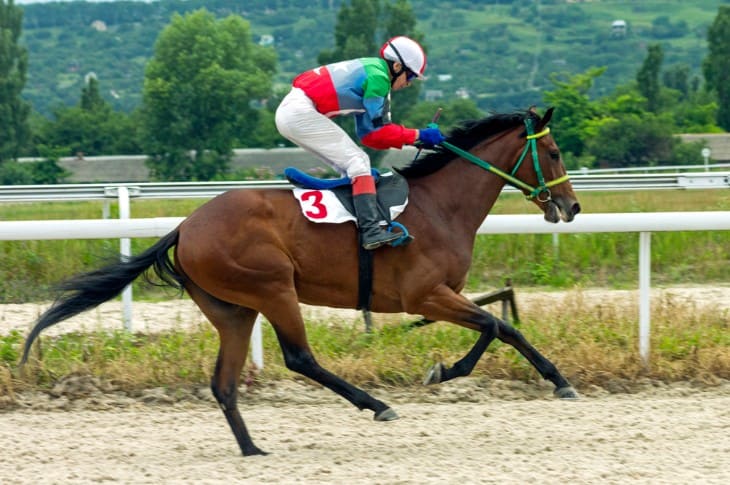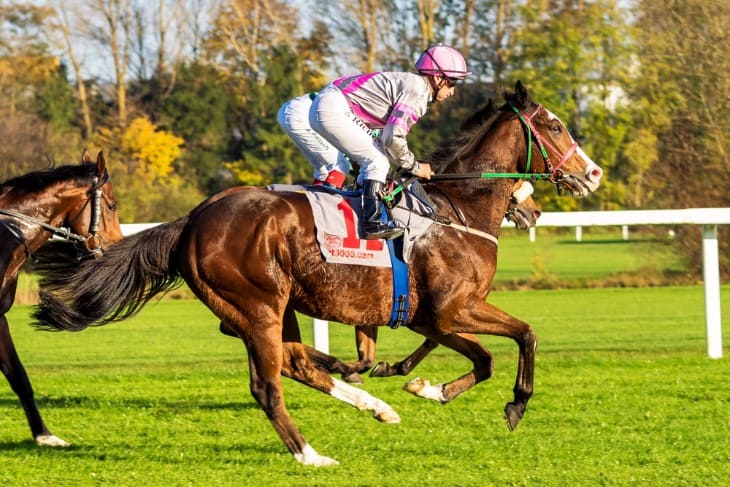Introduction
In the thrilling world of horse racing, where speed, skill, and temperament can mean the difference between victory and defeat, a seemingly subtle procedure holds the key to transforming fiery colts into composed champions. This transformation, known as gelding, is akin to sculpting raw potential into refined brilliance on the racetrack.
In this essay, we delve into the intricate world of what does gelded mean in horse racing, exploring the nuances of this procedure, its impact on the horse's physiology, the advantages it brings to the racetrack, and the ethical debates that surround this practice.
What Does Gelded Mean in Horse Racing?
So, what does gelded mean in horse racing? The term "gelded" refers to the process of castrating a male horse, meaning the removal of its testicles. This procedure is common in the horse racing industry and is usually done to improve the horse's behaviour and focus. When a male horse is gelded, it undergoes a surgical operation that renders it sterile and eliminates the production of testosterone. As a result, the horse's temperament tends to become more stable and manageable, making it easier to train and handle.
The decision to geld a horse is often made for several reasons. One primary motivation is to enhance the horse's racing performance. Gelded horses tend to be less aggressive and more focused on their races, allowing them to perform better on the track. Additionally, gelding can also improve a horse's compatibility with other horses, reducing conflicts and distractions during races and training sessions. Overall, gelding is a common practice in horse racing aimed at improving the horses' behaviour, temperament, and racing capabilities, making them more competitive and easier to work with for trainers and handlers in the industry.
Castration Procedure and its Implications on the Horse's Physiology
Castration is the surgical procedure performed to remove a male horse's testicles, which are the primary source of the hormone testosterone. The procedure is typically conducted by a veterinarian and involves several steps:
- Anaesthesia: The horse is administered anaesthesia to ensure it is unconscious and does not feel any pain during the procedure. There are various anaesthesia methods, including general anaesthesia or local anaesthesia combined with sedation, depending on the horse's age, health, and the preferences of the veterinarian.
- Preparation: Once the horse is anaesthetized, the surgical site, usually the scrotum, is thoroughly cleaned and disinfected to prevent infections. The area is shaved, and sterile drapes are placed around the surgical site to maintain a sterile field.
- Incision: The veterinarian makes one or two incisions in the scrotum, through which the testicles are accessed. These incisions are typically small and are carefully sutured after the procedure to promote proper healing.
- Removal of Testicles: The testicles are carefully removed through the incisions. Blood vessels and spermatic cords are tied off and cut, and the testicles are then separated from the horse's body. Special care is taken to minimize bleeding and ensure that there is no risk of infection.
- Closure: The incisions in the scrotum are closed using sutures or surgical staples. Proper closure is crucial to prevent complications such as infections or hernias.
After castration, the horse undergoes a recovery period during which it is monitored for any signs of discomfort, infection, or complications. Pain relief medication and antibiotics are often prescribed to manage pain and prevent infections during the healing process.

Implications on the Horse's Physiology
- Hormonal Changes: Castration removes the primary source of testosterone in the horse's body. Testosterone plays a significant role in the development of secondary sexual characteristics and behaviours in males. After castration, the levels of testosterone drop significantly, leading to behavioural changes such as reduced aggression and sexual activity.
- Behavioural Changes: Gelded horses often exhibit calmer and more manageable behaviour. They are generally less aggressive and territorial, making them easier to handle, train, and ride. The reduction in hormonal influence can lead to a more even temperament.
- Physical Changes: Gelding does not significantly alter a horse's physical appearance, aside from the absence of the testicles. However, the lack of testosterone can affect muscle development to some extent. Gelded horses might have a slightly different muscle structure compared to intact males, although the impact on athletic performance varies widely among individual horses.
- Reproductive Function: After castration, a horse cannot reproduce. It becomes sterile, and its ability to sire foals is eliminated.
Overall, castration has significant implications on a horse's physiology, particularly in terms of behaviour and reproductive capabilities. These changes are why the procedure is commonly performed to create more manageable and focused horses, especially in racing and other competitive equestrian activities.
Advantages of Gelding in Horse Racing
There are several advantages associated with gelding in horse racing:
- Improved Focus and Concentration: Gelding helps in reducing hormonal distractions, allowing the horse to focus better on training and racing. Testosterone-driven behaviours, such as aggression and restlessness, are significantly diminished, enabling the horse to concentrate on its performance.
- Enhanced Temperament: Gelded horses tend to be calmer and more even-tempered. They are less likely to be temperamental, making them easier to handle for trainers, jockeys, and stable staff. This improved temperament is particularly important in high-stress environments like race tracks, where horses need to remain composed and responsive.
- Better Compatibility: Gelding often makes male horses more compatible with other horses, especially in training and racing environments. They are less likely to display dominant behaviour, reducing conflicts and ensuring a more harmonious atmosphere in the stable and on the track. This compatibility is crucial for team dynamics, especially in relay races or events involving multiple horses.
- Extended Racing Careers: Gelded horses often enjoy extended racing careers due to their improved behaviour and focus. They are more likely to stay sound and healthy, allowing them to race competitively for a more extended period. This can be advantageous for both owners and trainers, as they can continue to earn from the horse's racing performances over a more extended period.
- Increased Market Value: Gelding can increase a horse's market value. Potential buyers and investors often prefer geldings due to their better temperament and enhanced focus. A well-trained, gelded horse can attract more buyers, leading to potentially higher sale prices, especially if the horse has a successful racing record.
- Safer Environment: Gelding also reduces the risk of injuries resulting from aggressive behaviour, both to other horses and to handlers. This creates a safer environment for everyone involved in the horse's care and training, reducing the likelihood of accidents or injuries caused by unruly behaviour.
Overall, the advantages of gelding in horse racing contribute significantly to the success and well-being of the horses, their handlers, and the industry as a whole.
Gelding and Horse Racing Performance
Gelding positively influences horse racing performance by promoting focus, trainability, consistency, and overall well-being. These factors combine to enhance the horse's competitiveness and contribute to its success on the racecourse.
- Improved Concentration and Focus: Gelding reduces aggressive and territorial behaviours often associated with intact male horses. Without the influence of testosterone, gelded horses tend to be more focused and less distracted during training and races. This enhanced concentration allows them to respond better to jockeys' cues and maintain their speed and stamina throughout the race.
- Enhanced Trainability: Gelded horses are generally easier to train due to their calmer temperament. They are more receptive to learning and adapting to new skills and techniques. Trainers can work more effectively with these horses, refining their racing techniques and strategies, which ultimately contributes to better race performances.
- Steady Racing Career: Gelded horses often have longer and more consistent racing careers compared to their intact counterparts. Their improved behaviour and reduced likelihood of injuries resulting from aggressive interactions make them more reliable on the track. A longer racing career allows these horses to gain valuable experience, increasing their competitiveness in races.
- Consistent Performance: Gelded horses are less prone to mood swings and erratic behaviour associated with hormonal changes in intact males. As a result, they tend to deliver more consistent performances in races. Predictable behaviour is crucial in horse racing, as it allows jockeys and trainers to develop effective race strategies and tactics tailored to the horse's reliable behaviour.
- Reduced Competition Anxiety: Gelded horses are often less stressed and anxious in the presence of other horses, both during races and in stable environments. Reduced competition anxiety ensures that the horse can conserve its energy for the race, preventing unnecessary stress-related fatigue that might affect its performance.
- Lower Risk of Injury: Gelding reduces the risk of injuries resulting from aggressive behaviours, both during training and races. Aggressive interactions among intact males can lead to biting, kicking, or other aggressive behaviours, which might cause injuries. Gelded horses, being more placid, are less likely to engage in such behaviours, promoting a safer racing environment.

Ethical Considerations and Controversies
Addressing these ethical considerations and controversies requires a balanced approach that considers both the welfare of the horse and the practical realities of the horse racing industry. Striking a balance between the interests of the animals and the needs of the industry remains an ongoing challenge, prompting ongoing discussions and debates within the horse racing community and among animal welfare advocates.
- Animal Welfare: One of the primary ethical concerns revolves around the welfare of the horse. Critics argue that gelding, being a surgical procedure, poses risks to the horse's health and well-being. While it is a common and generally safe procedure when performed by skilled veterinarians, any surgery carries inherent risks. Ethical concerns arise regarding whether these risks are justified, particularly for horses that might not be destined for a racing career.
- Informed Consent: Horses cannot provide informed consent for the procedure. This lack of consent raises ethical questions, especially if the decision to geld a horse is made primarily for the convenience of trainers and owners rather than for the horse's well-being. Critics argue that altering a horse's natural state without its consent is ethically questionable.
- Premature Gelding: Some argue that gelding horses at a young age, often before they've had a chance to mature physically and mentally, raises ethical concerns. Gelding too early can impact a horse's growth and development, potentially affecting its overall health and athleticism. Critics advocate for waiting until a horse is physically mature before performing the procedure.
- Alternative Training Methods: Some individuals advocate for exploring alternative training methods and behavioural techniques instead of resorting to surgical solutions. These methods focus on understanding and addressing the underlying behavioural issues in horses without altering their natural state.
- Overpopulation and Unwanted Horses: Gelding is often used as a means to control the horse population, preventing unwanted breeding and reducing the number of unwanted horses. However, ethical concerns arise when horses are bred indiscriminately, leading to overpopulation issues. This overpopulation, in turn, contributes to the dilemma of unwanted horses, potentially leading to their mistreatment or neglect.
- Cultural and Historical Perspectives: In some cultures and historical contexts, altering animals for human purposes has been widely accepted. Ethical considerations regarding gelding can vary based on cultural attitudes and traditions, leading to differing perspectives on the practice.
Summary
In horse racing, "gelded" refers to the castration of male horses, a surgical procedure that removes their testicles. This practice is prevalent in the racing industry to improve a horse's behaviour and focus. Gelding leads to reduced aggression and increased manageability, making horses calmer, more trainable, and easier to handle. Removing the primary source of testosterone also results in more consistent and focused racing performances. While the procedure raises ethical concerns regarding animal welfare and consent, it is widely utilized to create more reliable and competitive horses in the racing world.
For more information:
- What Does Yielding Mean in Horse Racing?
- What Does Each Way Mean in Horse Racing?
- How Fast is a Racing Horse?
- The Full History of William Hill








